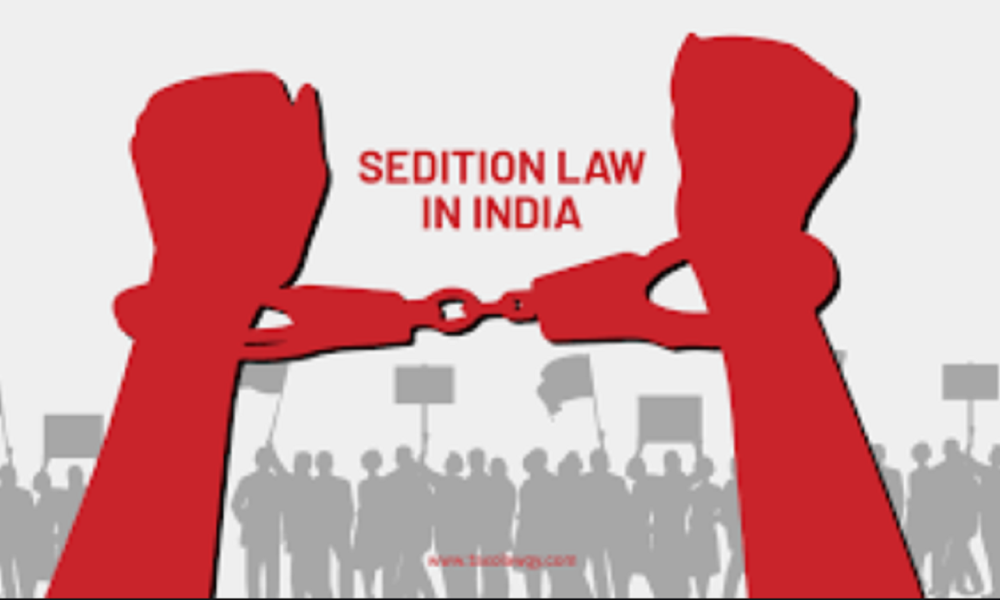Context: There have been numerous cases of arrests of the people charged with sedition and inflammatory play against the Citizenship Amendment Act over the last couple of months.
- For pro-Pakistani slogans, a 43-year-old man was charged with sedition at Kundapur in Karnataka’s Udupi district.
- As per the data from the National Crime Records Bureau (NCRB), 194 cases of sedition have been filed since the CAA was passed on December 11, 2019.
Backgroundof Sedition Law
- The law was originally drafted in 1837 by Thomas Macaulay, the British historian-politician, but was inexplicably omitted when the IPC was enacted in 1860.
- Section 124A was inserted in 1870 by an amendment introduced by Sir James Stephen when it felt the need for a specific section to deal with the offence. It was one of the many draconian laws enacted to stifle any voices of dissent at that time.
- The term ‘sedition’ has been defined under Section 124A of the Indian Penal Code.
- It is defined as an offence committed when “any person by words, either spoken or written, or by signs, or by visible representation, or otherwise, brings or attempts to bring into hatred or contempt, or excites or attempts to excite disaffection towards the government established by law in India”.
- Disaffection includes disloyalty and all feelings of enmity. However, comments without exciting or attempting to excite hatred, contempt or disaffection, will not constitute an offence under this section.
Usefulness of Sedition Law in India
- It helps in combating anti-national, secessionist and terrorist elements.
- It protects the government from being overthrown by illegal and violence means.
- It ensures continued existence of governments which is essential for the stability of the state.
- It acts as a useful tool in the hands of the local policemen who can first register a case.
- It is also a useful tool through which a local leader or the head of some faction can shut down a particular dissenter in the locality.
Arguments against Sedition Law
- It has its origin during the British era and has a relic of colonial rule which is unsuited for democracy.
- It is a constraint on the legitimate exercise of constitutionally guaranteed freedom of speech and expression.
- Criticism of the government is an important tool of a vibrant democracy. It should not be considered as sedition. Right to question, criticize and change rulers is very fundamental to the idea of democracy.
- The British have already discarded the sedition law in 2009. There is no reason for India to keep this law.
- Unlawful Activities Prevention Act has provisions that penalize “disrupting the public order” or “overthrowing the government with violence and illegal means”. These are sufficient for protecting the national integrity.
- It is being misused as a tool to persecute political dissent. A wide and concentrated executive discretion is inbuilt into it which permits the blatant abuse.
Supreme Court views on Sedition law
- In Kedar Nath Vs State of Bihar (1962), the Supreme Court upheld the law on the basis that this power was required by the state to protect itself.
- The Supreme Court added a vital caveat that “a person could be prosecuted for sedition only if his acts caused incitement to violence or intention or tendency to create public disorder or cause disturbance of public peace”.
- The court held that “a citizen has a right to say or write whatever he likes about the Government, or its measures, by way of criticism or comment,so long as he does not incite people to violence against the Government established by law or with the intention of creating public disorder”.
- In September 2016, the Supreme Court had reiterated these necessary safeguards and held that they should be followed by all authorities.
Viewpoint of Law Commission of India
- The Law Commission had rejected the idea of repealing the section in its 39th report in 1968.
- In its 42nd Report (1971), the panel wanted the scope of the section to be expanded to cover the Constitution, the legislature and the judiciary, in addition to the government to be established by law, as institutions against which ‘disaffection’ should not be tolerated.
- In August 2018, the Law Commission of India published a consultation paper recommending that it is time to re-think or repeal the Section 124A of the Indian Penal Code that deals with sedition.
- In the recent consultation paper on the sedition, the Law Commission has suggested invoking 124A to only criminalize acts committed with the intention to disrupt public order or to overthrow the Government with violence and illegal means.
Way Forward
- The time has come for the judiciary to step in and set up a search committee in every state related to sedition cases.
- A particular judge of the High Court has to sou motu check each sedition case being filed.
- The expression or thought that is not in consonance with the policy of the government of the day should not be considered as sedition.
- The Law Commission has rightly said, “an expression of frustration over the state of affairs cannot be treated as sedition”. If the country is not open to positive criticism, there would be no difference between the pre- and post-Independence eras.
- The Section 124A should be invoked only in cases where the intention behind any act is to disrupt public order or to overthrow the Government with violence and illegal means.
- While it is essential to protect national integrity, it should not be misused as a tool to curb free speech.
Additional Information
- Sedition is a non-bailable offence. Punishment under the Section 124A ranges from imprisonment up to three years to a life term, to which fine may be added.
- A person charged under this law is barred from a government job. They have to live without their passport and must produce themselves in the court at all times as and when required.
- There were numerous sedition cases in the late 19th and early 20th century involving nationalist leaders.
- The first among them was the trial of Jogendra Chandra Bose in 1891for criticizing the Age of Consent Bill in his newspaper, ‘Bangobasi’.
- The most well known sedition cases in pre-Independent India was the trial of Bal Gangadhar Tilak and Mahatma Gandhi in 1922.
- In 1979, India ratified the International Covenant on Civil and Political Rights (ICCPR), which sets forth internationally recognized standards for the protection of freedom of expression. However, misuse of sedition and arbitrary slapping of charges are inconsistent with India’s international commitments.
Source: The Hindu

